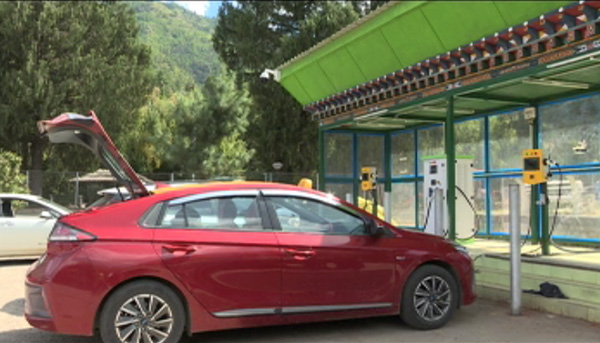 The electric taxi drivers in the country want chargers installed across the country. Today, the farthest the electric taxis in the country can travel is about 400 kilometres. Therefore, they are unable to travel beyond a few districts where there are chargers.
The electric taxi drivers in the country want chargers installed across the country. Today, the farthest the electric taxis in the country can travel is about 400 kilometres. Therefore, they are unable to travel beyond a few districts where there are chargers.
Tshewang Rinzin recently bought an electric taxi. He charges the car at the Lungtenzampa taxi parking. Once fully charged, he can travel about 300 kilometres. So, the farthest he travels is until Wangdue Phodrang because there are no charging stations beyond that.
“It is not a problem while we travel within Thimphu or in the nearby districts. Currently, charging stations are installed in Paro, Wangdue, Punakha and at Wangkha on the way to Phuentshogling. But it is a problem if we have to go on long tours like to Bumthang and beyond. It would help us if there are charging stations in Monggar, Trongsa, and Bumthang,” said Tshewang Rinzin, an Electric Taxi Driver.
Taxi drivers say limited charging stations is discouraging them from buying electric vehicles. Currently, there are 15 electric taxis. The government plans to replace 300 taxis with electric vehicles by September next year.
“When we talk about charging stations, we are not only talking about taxis but there are a lot of private electric vehicles as well. It takes about two to three hours to charge. So, without adequate charging points it will be difficult for us,” said Tshering Norbu, a Taxi Driver.
For a few taxi drivers, the chargers are not compatible with their electric vehicles.
Suresh Darjee who drives an electric taxi said “Without charging points, currently, we cannot travel to Dagana or Gelegphu. It will be helpful for us if there is a charging point along the highway between these districts. There are no fast-charging stations for the model I bought. And it takes longer to charge in the AC charger which is also available only at the agent. So, we have to use the normal plug at home to charge.”
But things will change. The Electric Vehicle project unit under the Prime Minister’s Office plans to install chargers in every district by 2023. The project manager, Sonamb Tobgye, said in the next three to four months, a team led by the Road Safety and Transport Authority will complete the feasibility study to install chargers.
“We will soon complete installing chargers at Tachhog Lhakhang in Paro and an adequate number of chargers in Phuentshogling. We have already completed the structures in these two locations. We only need to install the chargers. And this is only for phase one of the project. For phase two, the government has already approved Nu 69 M to install chargers in the remaining 14 districts,” he said.
He said the taxi drivers should do some research before buying electric vehicles. Currently, the charging stations in the country are compatible with European and Japanese standards.
“There are so many different types of chargers like phone chargers. It is just not practical, at least for now for us to install an outlet for each of these chargers. However, that said this is a free market economy and we do not want to limit technology. Interested electric vehicle dealers and buyers could still make their own choices and make arrangements if a particular vehicle’s charger is not found compatible with the charging stations that we have in Bhutan right now,” he added.
So far, the project has installed 22 chargers in six districts at a cost of more than Nu 17 M.
Phub Gyem
Edited by Tandin Phuntsho








